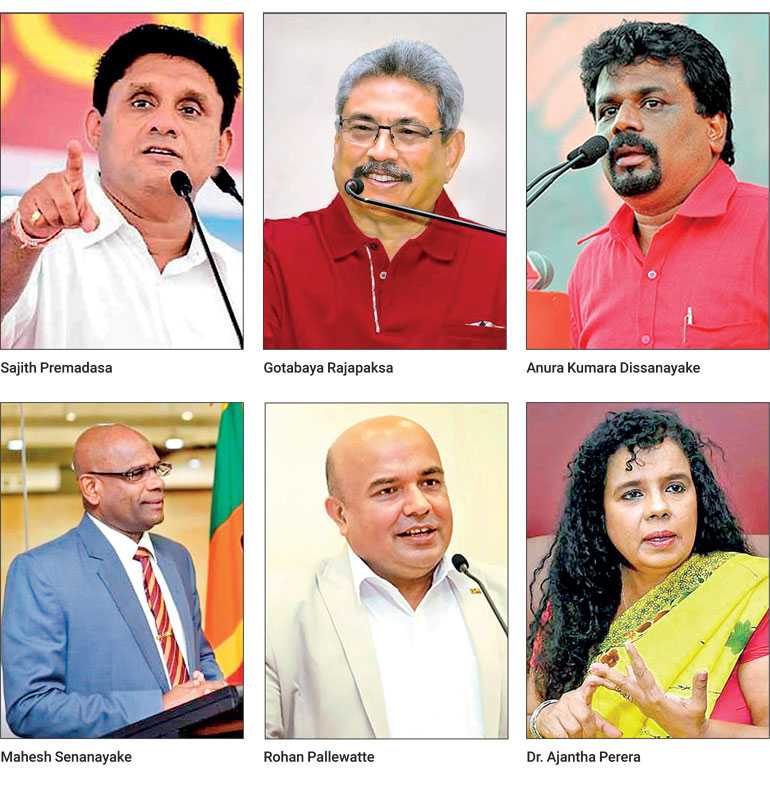Sunday Feb 22, 2026
Sunday Feb 22, 2026
Friday, 15 November 2019 00:00 - - {{hitsCtrl.values.hits}}

By Chandani Kirinde
Nearly 16 million Sri Lankans will go to the polls on Saturday to elect the eighth Executive President of the country, in an election that will see a record number of 35 candidates contesting the poll. The election will also be the most expensive in the country’s history, with the Election Commission estimating it to cost a staggering Rs. 7.5 billion.
Campaigning for the Presidential Election 2019 kicked off on 8 October after 35 of the 41 presidential aspirants who had paid their deposits handed in their nomination papers to the Election Commission. This is the highest number to contest a Presidential Election in the country since the first Presidential Election was held in 1982, and up from 18 candidates who contested the poll in 2015.
The two frontrunners in the election are Minister of Housing and Construction and UNP Deputy Leader Sajith Premadasa, who is contesting from the National Democratic Front (NDF), an alliance led by the United National Party, and former Defence Secretary Gotabaya Rajapaksa, a political novice contesting from the Sri Lanka Podujana Peramuna (SLPP), a party which was formed last year.
Premadasa is the son of Ranasinghe Premadasa, the second Executive President of the country, who was elected in 1988 and killed in a bomb explosion in 1993, before he could complete his first term in office. Rajapaksa’s brother Mahinda Rajapaksa served as Executive President twice, from 2005 to 2015, and has been the mainstay of the SLPP’s election campaign.
19th Amendment
This is the first Presidential Election being held since the enactment of the Ninetieth Amendment to the Constitution, which saw the term of office of the President reduced from six to five years, while the two term limit which was removed by the Eighteenth Amendment was also reintroduced by the Nineteenth Amendment.
The Constitutional Amendment also saw the pruning of some powers of the Executive President, but the new President still retains substantial powers and will remain Head of State, Head of Government and Commander-in Chief.
Staggering cost
The EC, which initially estimated the cost of the election at around Rs. 5 billion, disclosed on Wednesday that the cost could be close to Rs. 8 billion, given the additional expenses that have to be incurred owing the large number of candidates contesting the poll.
A 26-inch ballot paper, bigger ballot boxes, hundreds of additional personnel on election duty and miscellaneous expenses such as water, telephone, and electricity bills are factors that have pushed the election bill up, Commission Chairman Mahinda Deshapriya said.
Cardboard ballot boxes will be used in many polling centres at Saturday’s election, which are large enough to hold adequate numbers of ballot papers. “Given the length of the ballot paper, the wooden boxes cannot hold too many of them, which is why we chose the cardboard boxes,” Deshapriya said. These boxes however cost less than the plastic boxes which the EC initially tried to procure, but abandoned due to their high costs.
Logistical nightmare
The conduct of the election has proven to be a logistical nightmare for the EC. “There will be 70 polling agents in each counting center, as each candidate gets two each, and there will be 175 counting officers in each center. Due to this, there are several new measures we have to put in place. We have had to find larger buildings to accommodate these people,” the EC said.
Close to 400,000 public officials will be on duty for the election, and finding accommodation for them too has been an uphill task. “There are a large number of women officers, but we have to be mindful when we assign them to election duty, and ensure they have proper resting rooms and other facilities,” Deshapriya said.
He also said getting public officials to come on election duty has also been difficult. “Other than rabies, leprosy, and AIDS, public officials seem to be having all the illnesses during election time, or all their parents fall ill, or they all have other family commitments. We can understand a few having such issues, but all of them cannot be having the same problems during election time,” he said.
Security measures
The 2019 Presidential Election campaign has been among the most peaceful so far, with no election related deaths reported, and among the close to 4,000 incidents of election law violations reported, acts of violence were minimal. “In 2015, nomination day itself saw a man being shot, and this was followed by many acts of violence, but this time it has been peaceful,” Deshapriya said.
More than 60,000 Police personnel will have been deployed for election duty, while in some areas members of the armed forces too will be on duty, the EC said.
Role of media
Both State-owned and private media organisations came under severe criticism from the EC for gross disregard for the guidelines issued by the Commission for media institutions to follow during the election campaign.
The Commission said that electronic media were the worst offenders, driven to promote candidates of their preference with the sole objective of victory at any cost for their person, which deprived the public from getting balanced news during the campaign. “We acted with regards to State media and they corrected their position to some extent but with the private media it has been more difficult. We maintain that private television and radio stations operate on spectrums issued by the Telecommunication Regulatory Authority (TRC) and hence these are public-owned, they should abide by the EC’s guidelines. We will pursue legal action against these parties once the election is over,” the Commission Chairman said.
